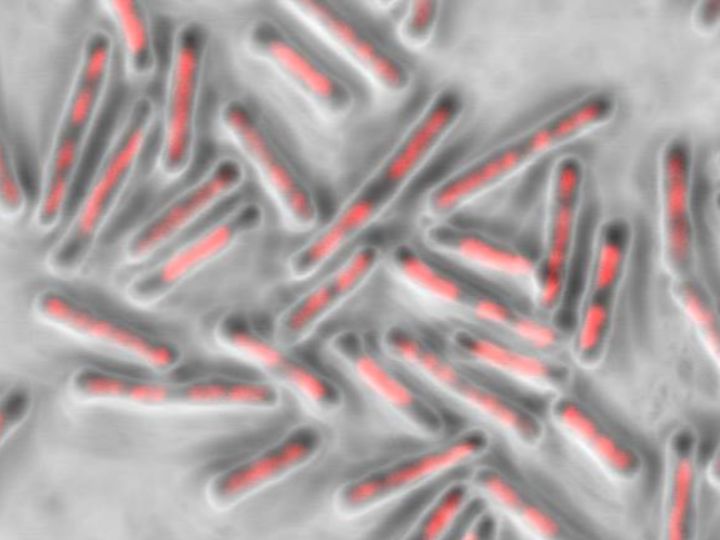- 米国で最も一般的な医療関連感染症であるC. Diffに対応するマイクロバイオーム治療薬を開発 Microbiome Therapeutic Tackles C. Diff, the Most Common Health Care-Associated Infectious Agent in the U.S.
米国で最も一般的な医療関連感染症であるC. Diffに対応するマイクロバイオーム治療薬を開発 Microbiome Therapeutic Tackles C. Diff, the Most Common Health Care-Associated Infectious Agent in the U.S.
2023-01-31 ヒューストン大学(UH)

Community of Clostridium difficile (or C. diff) bacteria. It is the most common health care-associated infectious agent in the U.S. and is estimated to cause more than 460,000 infections and 20,000 deaths annually.
◆SER-109は、C. diffと代謝的に競合し、C. diffに対するコロニー形成抵抗性を回復するように設計された、生きた精製ファーミキューテス菌の芽胞を含む錠剤です。
◆スーパーバグ(抗生物質に耐性を持つ細菌)の中で、C. diffは最も頑固な細菌の一つです。C. diff感染症の症状は、生命を脅かすだけでなく、特に再発性の患者では長期にわたって持続する可能性があります。
◆Garey 氏は、Journal of the American Medical Association (JAMA) Network Open において、「この探索的分析において、SER-109 を投与された患者は、プラセボ投与患者に比べ、健康関連 QOL (HRQOL) スコアに 1 週間目から有意に大きな改善を示し、8 週目まで継続的かつ着実に改善しました」と報告しています。Garey 氏は、疾患特異的な QOL 調査(Cdiff32)測定を開発しました。”これらの知見は、治験中のマイクロバイオーム治療薬が、患者に関連する重要なアウトカムであるHRQOLを改善する可能性を示唆しています。”
◆SER-109のQOL改善効果は、Garey博士らが独自に開発したQOL質問票を用いて、182名の成人のC. dif感染症患者を対象に検証されました。
◆もう一つのポジティブな知見は、臨床転帰に関係なく、SER-109を服用した患者において、試験開始8週目に精神領域およびサブドメインのスコアの改善が観察されたことである。
<関連情報>
- https://uh.edu/news-events/stories/2023/january-2023/01312023-garey-cdiff-trial-ser.php
- https://jamanetwork.com/journals/jamanetworkopen/fullarticle/2800818
口腔マイクロバイオーム治療薬SER-109を投与されたクロストリジオイデスディフィシル感染症再発患者のQOLの評価、無作為化臨床試験の二次分析。 Assessment of Quality of Life Among Patients With Recurrent Clostridioides difficile Infection Treated with Investigational Oral Microbiome Therapeutic SER-109、Secondary Analysis of a Randomized Clinical Trial
Kevin W. Garey, Jinhee Jo, Anne J. Gonzales-Luna, Brittany Lapin, Abhishek Deshpande, Elaine Wang, Brooke Hasson, Sissi V. Pham, Shirley P. Huang, Pat Ray Reese, Henry Wu, Elizabeth Hohmann, Paul Feuerstadt, Caterina Oneto, Charles S. Berenson, Christine Lee, Barbara McGovern, Lisa vonMoltke
Journal of the American Medical Association Published:January 30, 2023
DOI:doi:10.1001/jamanetworkopen.2022.53570
Key Points
Question Is treatment with an investigational microbiome therapeutic, SER-109, associated with disease-specific health-related quality-of-life (HRQOL) in adults with recurrent Clostridioides difficile infection compared with placebo after standard-of-care antibiotics?
Findings In this secondary analysis of a randomized clinical trial in 182 adults, patients treated with SER-109 had significantly greater improvements in disease-specific HRQOL scores compared with patients treated with placebo as early as week 1, with continued steady and durable improvements by week 8 after dosing.
Meaning These findings suggest that an investigational microbiome therapeutic may improve disease-related HRQOL, an important patient-related outcome.
Abstract
Importance Recurrent Clostridioides difficile infection (CDI) is a debilitating disease leading to poor health-related quality of life (HRQOL), loss of productivity, anxiety, and depression. The potential association of treatment with HRQOL has not been well evaluated.
Objectives To explore the association of SER-109 compared with placebo on HRQOL in patients with recurrent CDI up to week 8.
Design, Setting, and Participants This study was a secondary analysis of a randomized, double-blind, placebo-controlled trial that took place at 56 sites in the US and Canada from July 2017 to April 2020 and included 182 patients randomized to SER-109 or placebo groups.
Interventions SER-109 or placebo (4 capsules once daily for 3 days) following antibiotics for CDI.
Main Outcomes and Measures Exploratory analysis of HRQOL using the disease specific Clostridioides difficile Quality of Life Survey (Cdiff32) assessed at baseline, week 1, and week 8.
Results In this study, 182 patients (109 [59.9%] female; mean age, 65.5 [16.5] years) were randomized to SER-109 (89 [48.9%]) or placebo (93 [51.1%]) groups and were included in the primary and exploratory analyses. Baseline Cdiff32 scores were similar between patients in the SER-109 and placebo groups (52.0 [18.3] vs 52.8 [18.7], respectively). The proportion of patients with overall improvement from baseline in the Cdiff32 total score was higher in the SER-109 arm than placebo at week 1 (49.4% vs 26.9%; P = .012) and week 8 (66.3% vs 48.4%; P = .001).Greater improvements in total and physical domain and subdomain scores were observed in patients in the SER-109 group compared with placebo as early as week 1, with continued improvements observed at week 8. Among patients in the placebo group, improvements in HRQOL were primarily observed in patients with nonrecurrent CDI while patients in the SER-109 group reported improvements in HRQOL, regardless of clinical outcome.
Conclusions and Relevance In this secondary analysis of a phase 3 clinical trial, SER-109, an investigational microbiome therapeutic was associated with rapid and steady improvement in HRQOL compared with placebo through 8 weeks, an important patient-reported outcome.
Trial Registration ClinicalTrials.gov Identifier: NCT03183128


